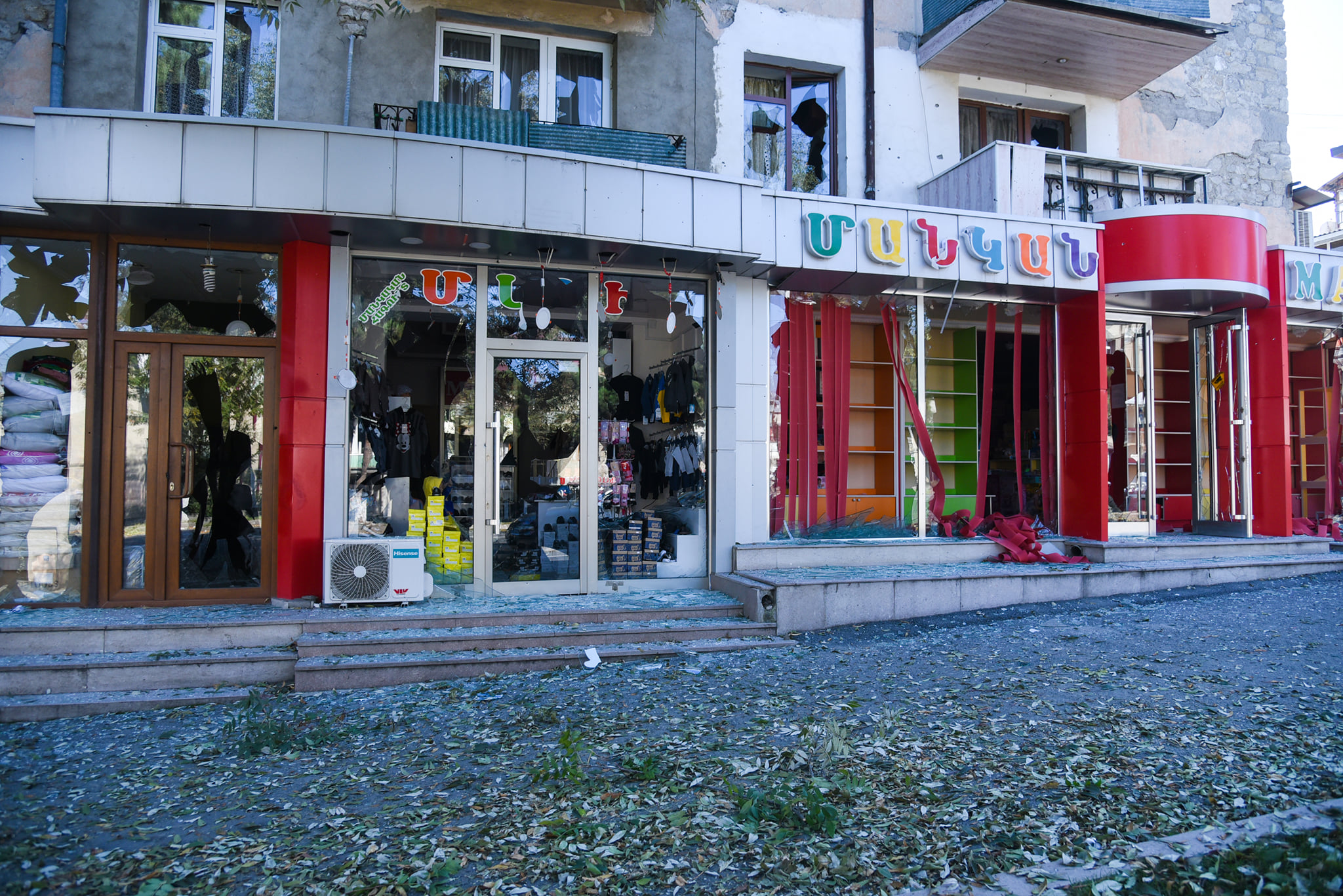
Hopes for a humanitarian ceasefire were dashed when Azerbaijan committed multiple violations of the truce agreement in the hours immediately following its commencement. This is the second time that Azerbaijan has violated a ceasefire agreement established between Armenia and Azerbaijan and mediated by an OSCE co-chair country within the past week.
The ceasefire, brokered by France and announced Saturday evening, was meant to begin on October 18 at midnight local time. The announcement followed the collapse of an initial humanitarian ceasefire declared on October 10 for the purpose of exchanging prisoners of war and the bodies of deceased soldiers. “Once again, Azerbaijan and Turkey have demonstrated that they continue to consider agreements on humanitarian truce, and negotiations in general, exclusively in the context of a military solution of the conflict,” the Ministry of Foreign Affairs (MFA) of Artsakh stated in response to the ceasefire violations.
At 12:04 AM, four minutes after the official start of the ceasefire, the Azerbaijani military began to fire artillery shells in the northern direction of the Line of Contact (LoC) until 2:45 AM. Between 2:20 AM and 2:45 AM, it launched rockets in the southern direction. The situation along the LoC remained relatively calm for the remainder of the night until the morning, when the Azerbaijani armed forces initiated military offensives in the northern direction and in two positions in the southern directions of the LoC, precipitating intense fighting. The Azerbaijani military was successfully pushed back in the north and in one position in the south by the Artsakh Defense Army.
Video surveillance devices of the Artsakh Defense Army recorded the exact location and time of how the enemy launched an offensive in the direction of the Armenian positions in the early morning hours of October 18, violating the agreement for ceasefire. pic.twitter.com/XjSCvq6tle
— Shushan Stepanyan (@ShStepanyan) October 18, 2020
The Azerbaijani military lost many armored units and weaponry throughout the day, and both sides suffered high numbers of military casualties and injuries. The Defense Army destroyed four tanks in the southern direction and nine unmanned aerial vehicles (UAVs), two of which were shot down in Armenian airspace. The Azerbaijani military continued to rely primarily upon its air attack capabilities, including UAVs and artillery systems. The Artsakh Defense Ministry released 77 new names of soldiers killed in combat today, bringing the total military death toll to 710.
Armenian officials collectively reiterated that international recognition of the independence of the Republic of Artsakh is the only recourse to end the military conflict and restore peace and security to the region. “The recognition of the independence of the Republic of Artsakh will put an end to attempts of resolving the Azerbaijan-Karabakh conflict by force and will give the necessary impetus for the effective continuation of international mediation efforts within the framework of the OSCE Minsk Group co-chairmanship,” the Artsakh MFA declared.
Due to the prompt violation of both ceasefire agreements by Azerbaijan, efforts to facilitate the exchange of prisoners of war and casualties have been stymied. According to the MFA of Armenia, the International Committee of the Red Cross attempted to oversee the withdrawal of wounded soldiers from the battlefield following the truce agreement yesterday, yet this step was categorically rejected by Azerbaijan. “The Aliyev clan…[is] terrified of the inevitable prospect of being accountable before its own people for unleashing a war and for the numerous lives it has claimed [and] tries to postpone the unavoidable moment of truth,” the MFA said.
The Armenian Ministry of Health warned that the refusal to collect the bodies of deceased soldiers along the Line of Contact poses the risk of the spread of various infectious diseases, particularly in the midst of a pandemic. These threats to public health are exacerbated by the destruction of critical civilian infrastructure in Artsakh, including damage to water supply and sewer systems, which creates favorable conditions for the outbreak of infectious illnesses.
The Armenian UNICEF Goodwill Ambassadors also addressed the humanitarian crisis in Artsakh, entreating the leadership of UNICEF to break its silence on the deprivations of human rights committed by Azerbaijan. “Children fall victim to violent bloodshed. They are subjected to psychological trauma and sufferings and are in dire need for help regardless of what nation they belong to and irrespective of the area they live in,” their collective statement reads. “Now the children of Artsakh are under existential threat, but as all children in the rest of the world, they have the right to live and the right to be protected.”
The High Representative for the European Union Josep Borrell for his part released a statement calling on all attacks against civilians to end immediately and imploring unconditional respect for the ceasefire agreement. “This [fighting] leads to more civilian suffering. It aggravates the conflict between States and respective societies, rendering the healing of wounds even more difficult. The population in Nagorno Karabakh has already experienced excessive suffering,” the statement reads.
This came just hours after a statement from the European External Action Service condemning yesterday’s “so-called Armenian strikes on Ganja.” The Armenian MFA refuted the allegation, reiterating the continuous targeting of civilian settlements and infrastructure by Azeri forces. “The current large-scale aggression was preceded by Azerbaijani provocative disinformation and smearing campaigns,” the MFA asserted, calling on the European Union to address evidence of Azerbaijan’s war crimes.
Meanwhile, on October 18, members of the “Alternative for Germany” Party from the Bundestag visited the Artsakh National Assembly. The members of each respective parliament discussed the aggression of the Azerbaijan-Turkey-terrorist alliance unleashed onto Artsakh, the Turkish threat to Europe and possibilities for the peaceful settlement of the conflict. The German visitors stressed the need to impose sanctions on Turkey and Azerbaijan.



Be the first to comment